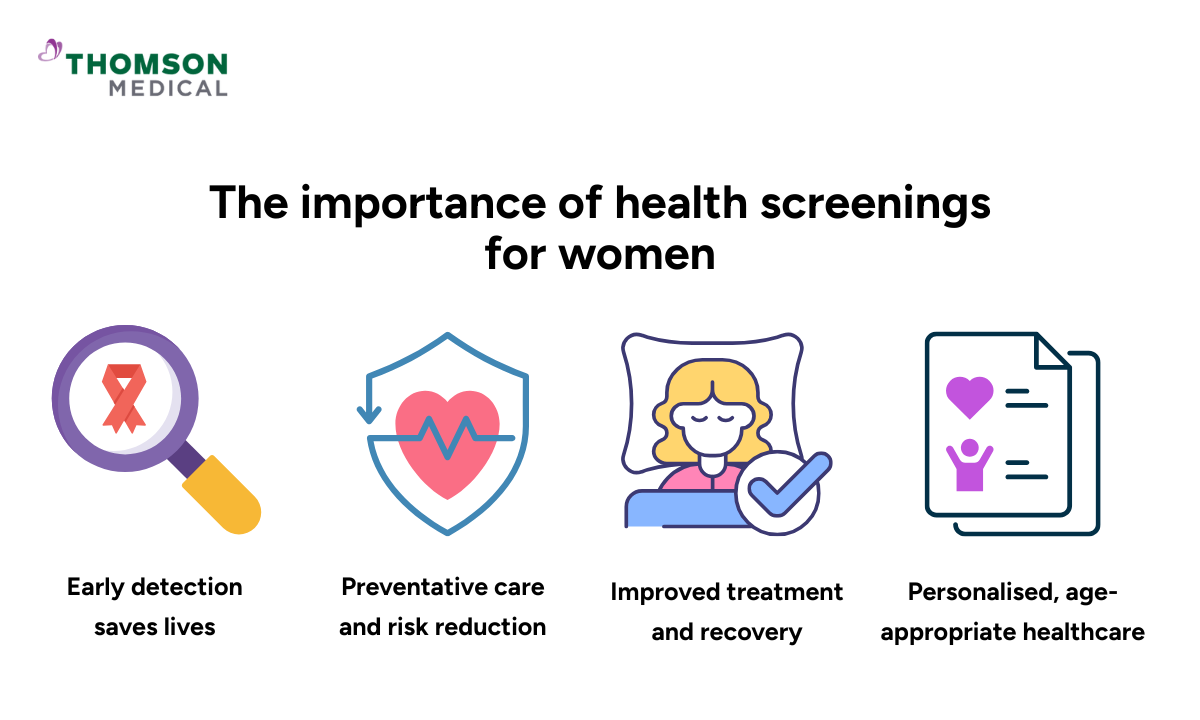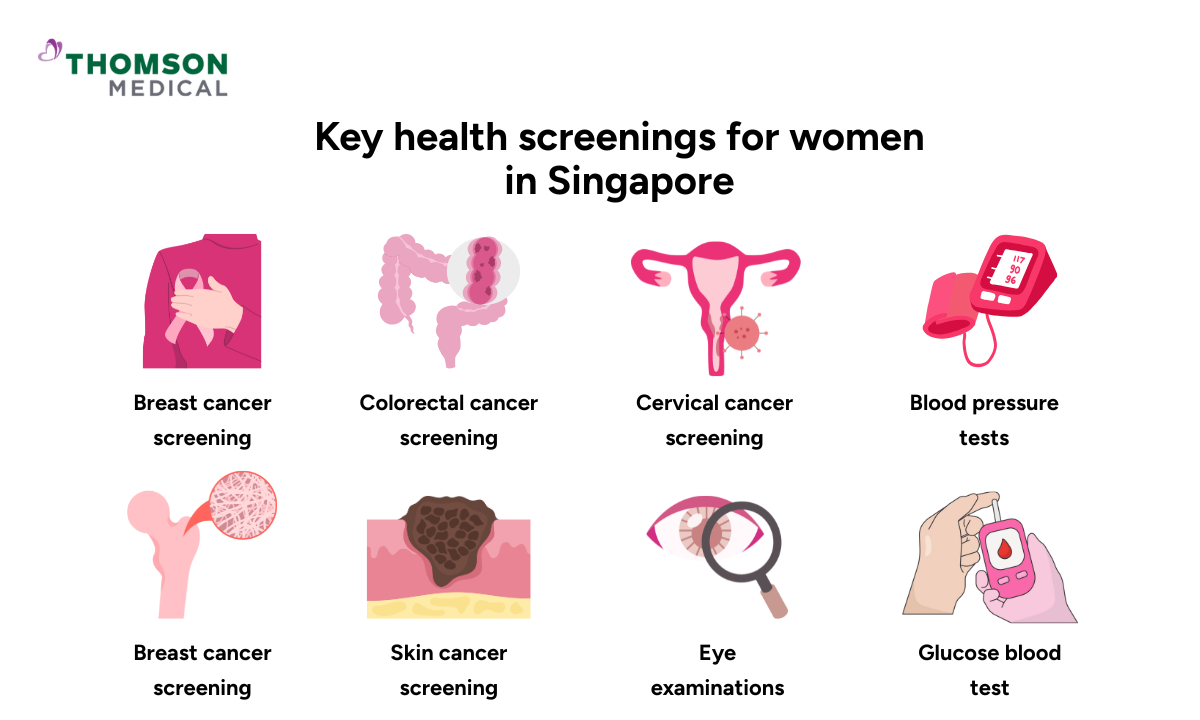Health screenings for women
Health screenings are preventive medical tests designed to detect diseases or health conditions at an early stage—often before any symptoms develop.
For women, these screenings play a crucial role in safeguarding long-term health by identifying issues such as cervical cancer, breast cancer, osteoporosis, high blood cholesterol, and reproductive health concerns.
Regular health screening tests, tailored to a woman’s age, family history, and personal risk factors, are essential for maintaining physical and emotional well-being. Whether you're in your 20s, 40s, or beyond, understanding which screenings are recommended—and when to schedule them—can empower you to take charge of your health at every stage of life.
The importance of health screenings for women

Health screenings are a vital component of preventive healthcare, especially for women to enhance their quality of life at different ages. These assessments offer far more than just routine check-ups—they provide an opportunity to detect hidden health issues, prevent disease progression, and personalise medical care.
Early detection saves lives
Many serious conditions, such as breast cancer, cervical cancer, heart disease, and diabetes, often develop silently with no early warning signs. Screening tests can identify these conditions in their earliest stages—when treatment is more effective and outcomes are significantly better.
Preventative care and risk reduction
Health screenings can identify risk factors like high blood pressure, high cholesterol, or precancerous changes, enabling early interventions that can halt the progression of disease. For example, a routine Pap smear can detect cervical cell changes before they turn cancerous.
Improved treatment and recovery
When conditions are found early, treatments can be less invasive, more affordable, and more successful. Early-stage diseases often require shorter recovery periods and reduce the risk of long-term complications.
Personalised, age-appropriate healthcare
Health screenings help healthcare providers develop personalised care plans based on a woman’s age, family medical history, and lifestyle. Whether it’s scheduling a mammogram at 40 or managing cholesterol in your 30s, these tests ensure your healthcare is tailored to your specific needs.
Regular screenings empower women to take control of their health and support lifelong wellness through informed, proactive care. Request an appointment with Thomson Medical today to schedule your personalised health screening with our healthcare professionals.
Key health screenings for women in Singapore

Here are some of the most important health screenings every woman should know about:
Breast cancer screening
Mammograms:
A mammogram is a low-dose X-ray that can identify early signs of breast cancer—one of the most common cancers among women. Early detection significantly improves treatment outcomes.
If you have dense breasts or are at higher risk of breast cancer, your doctor may recommend Contrast Enhanced Mammography (CEM). This imaging technique combines standard mammography with contrast dye to provide clearer images and improve cancer detection, particularly in dense breast tissue.
Women aged 40 and above are generally recommended to undergo mammography every 1 to 2 years.
Breast self-exams and clinical exams:
Women are encouraged to perform monthly breast self-exams to become familiar with their normal breast tissue and spot any unusual changes.
In addition, clinical breast exams performed by a healthcare provider during routine check-ups add another layer of early detection.
Colorectal cancer screening
Colonoscopy:
A colonoscopy is considered the gold standard—not only does it detect cancer, but it also identifies and removes precancerous polyps in a single procedure.
Screening for colorectal cancer typically begins at age 45, or earlier for women with a family history of the disease.
Faecal occult blood test:
An Faecal occult blood test (FOBT) is non-invasive, at-home test checks stool samples for hidden blood, which may indicate the presence of colorectal cancer or other gastrointestinal conditions.
It is typically recommended annually or as advised by your doctor.
Flexible sigmoidoscopy:
This minimally invasive procedure examines the lower portion of the colon to detect polyps, inflammation, or signs of cancer.
While not as comprehensive as a colonoscopy, it may be an option for certain individuals as part of a broader screening plan.
Cervical cancer screening
Pap smear:
A Pap smear is a critical screening test for cervical cancer – one of the most common cancers among women.
Women should begin Pap smear testing at age 21 and continue at regular intervals until age 65, or as recommended by their healthcare provider.
HPV (human papillomavirus) testing:
HPV is the leading cause of cervical cancer. For women aged 30 and above, HPV testing is often done alongside the Pap smear to check for high-risk HPV strains.
Co-testing enhances accuracy and may allow for longer intervals between screenings if results are normal.
Together, Pap smears and HPV testing form a cornerstone of preventive measures in women’s gynaecological health, helping to safeguard fertility and overall reproductive well-being. These screenings not only help safeguard fertility and reproductive well-being but also play a vital role in the early detection of female cancers.
Blood pressure and blood tests
Blood pressure monitoring:
High blood pressure is a silent but serious risk factor for heart disease, stroke, and kidney issues.
All women should begin monitoring their blood pressure from age 18, with more frequent checks if they have underlying risk factors or existing conditions.
Cholesterol and blood glucose tests:
Regular cholesterol tests and glucose blood tests help detect elevated cholesterol levels and high blood sugar—both of which are major contributors to cardiovascular disease and diabetes.
Women over the age of 40 should undergo these tests every few years, or more frequently if they are at risk.
Other recommended screenings
Bone density test (DEXA scan):
Osteoporosis is more common in post-menopausal women and those aged 65 and above.
A bone mineral density scan (DEXA) measures bone strength and helps identify early signs of bone loss, allowing for lifestyle adjustments or medical treatment to prevent fractures.
Skin cancer screening:
Regular skin examinations are important, particularly for women with fair skin, a history of sun exposure, or a family history of melanoma.
Dermatologists can identify suspicious moles or lesions and perform biopsies if needed.
Eye examinations:
Annual eye exams are essential not only for maintaining vision but also for detecting conditions like glaucoma, cataracts, and diabetic retinopathy—diseases that can develop silently and may reflect broader systemic health concerns.
Maintaining good health begins with informed and timely treatment. Request an appointment and schedule your women’s health screening with Thomson Medical today.
Choose the right health screening for you
Thomson Medical provides health screening services for women of different age groups.
Available screening services include:
For women under 40:
- Reproductive health assessments
- Cervical cancer screening
- Sexually transmitted infection tests
For women aged 40 and above:
- Mammograms
- Bone density scans
- Cardiovascular risk assessments
- Reproductive health assessments
- Cervical cancer screening
Additional screening frequencies may be recommended by physicians based on family medical history.
Thomson Medical offers various health screening packages for women. If you have any questions, feel free to send in an enquiry.
FAQ
What does a women’s health panel test for?
A women’s health panel is a comprehensive set of blood tests designed to assess overall health and detect potential health issues early. It typically includes:
Cholesterol profile – to evaluate heart disease risk
Blood glucose levels – to screen for diabetes or prediabetes
Liver function and kidney function tests – to monitor vital organ health
Thyroid function tests – to detect imbalances that may affect metabolism, mood, or energy levels
Complete blood count (CBC) – to identify signs of anaemia, infection, or other blood-related concerns
Vitamin D levels – to assess bone health and immune support
Some panels may also include hormonal and sexual health markers, particularly for women experiencing symptoms related to fertility, menstruation, or menopause.
What health screenings are available for menstrual issues?
Screenings for menstrual health help identify causes of irregular or painful periods. These may include:
Pelvic exam – to detect cysts, fibroids, or infections.
Hormone tests – to assess levels of oestrogen, progesterone, and FSH, often used to diagnose PCOS or hormonal imbalances.
Ultrasound – pelvis ultrasounds are commonly used for menstrual and reproductive health concerns, while breast ultrasound may be recommended to assess lumps or dense breast tissue alongside mammograms.
These tests can uncover underlying conditions affecting menstrual cycle and reproductive health.
What age should you get a Pap smear?
Women should begin Pap smear screenings at age 21. From 21 to 29, it’s recommended every 3 years if results are normal. From age 30 to 65, Pap smears combined with HPV testing can be done every 5 years. Those with higher risk factors may require more frequent screenings as advised by their doctor.
When should women start having a colonoscopy?
Women at average health risk should begin colorectal cancer screening with a colonoscopy at age 45. If there’s a family history of colorectal cancer or other risk factors like inflammatory bowel disease, your doctor may recommend starting earlier and screening more often.
Which test is best for a full-body checkup?
A full-body checkup typically includes blood tests, cancer screenings (e.g. Pap smear, mammogram, colonoscopy), blood pressure monitoring, urinalysis, and vision or hearing tests. Women over 65 may also need a bone density scan. Your doctor will recommend the most suitable tests based on your age, lifestyle, and medical history.
How often should a woman get blood work done?
Women should generally have routine blood work done once a year as part of an annual health check-up. However, the frequency may vary depending on age, existing medical conditions, or risk factors. Your doctor may recommend more frequent testing if you are monitoring cholesterol, blood sugar, thyroid function, or other specific health concerns.
At what age is a full body check-up best?
A full body check-up is generally recommended from the age of 30 onwards, especially for women with a family history of chronic diseases or lifestyle-related risk factors. However, baseline health screenings in the 20s can help establish health issues early. After age 40, regular health screenings become more important to monitor for age-related conditions and ensure early detection.
How long does a full-body health screening take?
A full-body physical examination typically takes between 2 to 4 hours, depending on the number and type of tests included. This may involve blood tests, imaging scans, physical exams, and consultations. Some results may be available on the same day, while others, such as laboratory or imaging reports, may take a few days to be processed and reviewed by your doctor.
The information provided is intended for general guidance only and should not be considered medical advice. For personalised recommendations and tailored advice, please consult a specialist at Thomson Medical. Request an appointment with Thomson Medical today.
For more information, contact us:
Thomson Specialists Paragon (Health Screening)
- Mon - Fri: 8.30am - 5.30pm
- Sat: 8.30am - 12.30pm
Call: 6735 0300
See Health Screening Packages
Notice:
The range of services and tests may vary. Please contact us directly to enquire about the current availability.
Book Health Screening